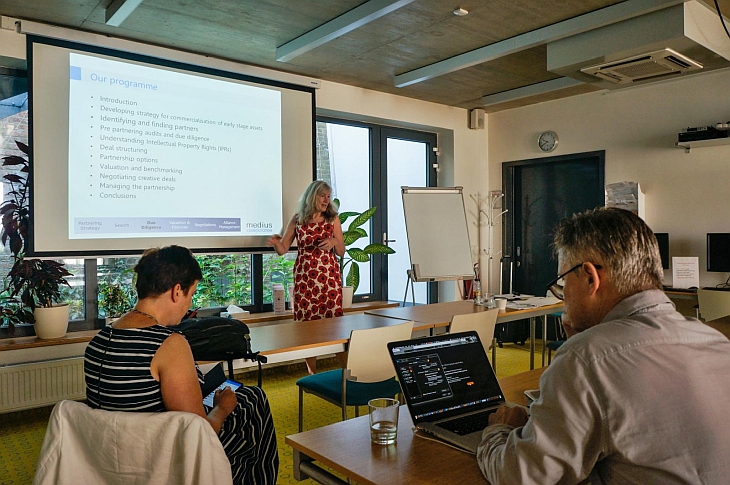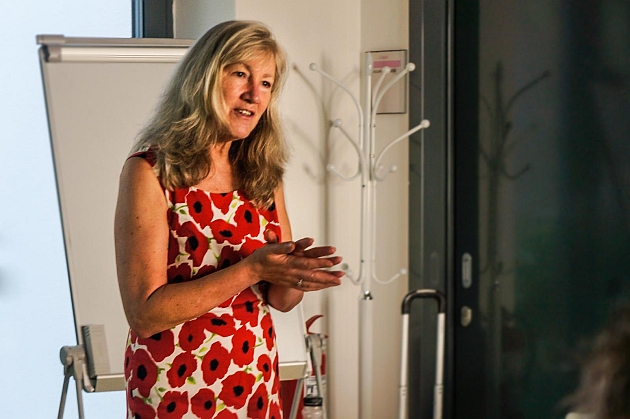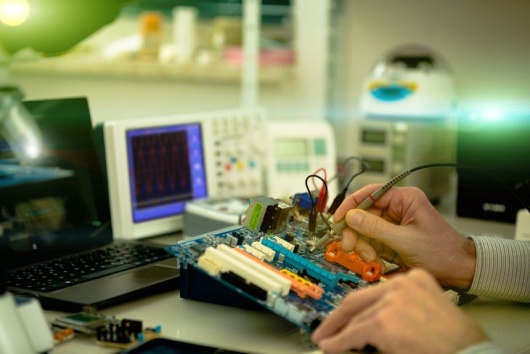Jan Pilátová • 25 July 2019
Technology Transfer people are essential to connecting universities with the commercial sphere
An interview with Sharon Finch
Sharon Finch is an expert in Technology Transfer (TT) who spoke recently at Charles University on the subject of bridging researchers and universities and the commercial sphere through so-called TTOs or Technology Transfer Offices.
She is the founder and CEO of Medius Associates, a boutique dedicated business development consultancy company. Sharon has worked in business development since joining the industry and has more than 35 years proven experience. With a comprehensive knowledge of business development and licensing, she has extensive experience of identifying, creating, implementing and directing international business deals.

Esteemed guest at Charles University Sharon Finch giving a lecture on Technology Transfer.
She was interviewed by PhD student at the Faculty of Science and technology scout Jana Pilátová.
There are a number of definitions of Technology Transfer that intersect in different aspects; how do you define TT?
“I would describe TT as taking an innovation – in life-sciences it could be a new process, a new drug, a medical device, diagnostics – from its originator through partnership to the commercial sphere or to the marketplace. In life-sciences we are always trying to improve the quality of people’s lives. Innovation is almost always driven by therapeutic need. Most scientists are able to identify gaps in the marketplace and are able to come up with innovative solutions to try and solve the problem. On the most elementary level, TT is about problem solving.
The most important thing is that somebody who is highly skilled in the art has used their own intelligence and experience to create something new. From a university perspective, universities often lack satisfactory resources to take technology forward into the commercial sphere.
There may be regulatory hurdles, developmental hurdles and there will be risk: a risk that certain technology will not prove robust enough in the marketplace. So consequently, partners - who are able to provide some of the skills or know-how that universities lack - are needed to act as a bridge. TT people connect the university with the commercial sphere. There is a difference in the strategy and the language and the attitude and the outcomes – so a translational effort is needed and this is the environment in which TT people work.”
How difficult is it to get something on the market?
“This is a technology driven situation – if the technology and science are not sound it will not be successful. The TT person has to look at the asset on the development from all perspectives and then consider how to identify the best opportunities: an opportunity may be financial, commercial or otherwise and it is up to the TT person to get potential partners on board.
This kind of translational work is only successful when you introduce the originator or creator – in short, your leading scientist - to the eventual partner. And this is where we get a fascinating blend of hard science and interpersonal skills. It takes a great deal of trust for the scientist to believe that the commercial partner or a company will do his invention justice. It takes a lot of understanding by the company and respect for the original idea, knowing at the same time that some changes will be needed and the product will have to be changed in some ways to make it more viable for the market.
Along the way there will be a development stage; there will be a lot of people that need to bring their skills to the project. And there will be a scientific part. You have market people looking at what is the best market attractive form – you will have IP people looking at how to best protect the invention against competition that is very important because without having some degree of protection on the market place – the company investing will not be able to recover its original investment. If we are looking into a pharmaceutical product where the investment may be a billion dollars it becomes very important to make sure the IP is secure.”
What are other aspects that are important?
“There is a lot of interesting discussion along the way between the parties agreeing to the developmental negotiating what the remuneration package should be for the inventor or all the inventors´ institutions in some cases. So again, getting a key understanding to the finance behind the opportunity – what the development costs will be, what the market potential might be and then to determine the overall profit of the project and then agree on equitable share between the parties is one of the most important parts.
Both parties have to feel respected and rewarded, to feel really motivated to make it work. The relationship is going to have to weather changes, personnel on either side may change, there can be changes in market circumstances, the technology itself may not perform as originally anticipated, so there are lots of fine points where a deal can come undone. And this is where trust and the quality of the relationship is very important. Both parties have to want to get the project all the way to the end. If you look at a pharmaceutical product that could be 12 years in development, it is understandably quite a high-risk business.”

Technology Transfer expert Sharon Finch.
I often hear from scientists that they have no time for TT. Is that the case?
“Well TT is not their main focus or their role. The same thing happens actually with pharma companies because with lots of clinicians or regulatory people, TT is not their main job either. But innovations have become so important to pharmaceutical companies that they too recognize that without external innovation that they would not be successful.
There are reward schemes in place in different universities and I am not familiar of with what is applied here. It comes down almost more to a personal issue. Some scientists get on board because they understand that their invention can have such an amazing impact that it becomes quite a personal crusade to want it to share it with others and to get it professionally developed and released.
There can be a quick ‘birth’ or development of a project but it depends on the level of trust in the TT agreement with the third parties in place. Having said that, a close working relationship between scientists and TTOs (Technology Transfer Offices) help bring TT people far more up to speed with the technology in question.
So in that situation again if there is a good trust with the TTO they can take on quite a lot of responsibilities for the scientists. I think that many universities that we now work with highly recognize the importance of collaborations with industry.
One of the facets we have seen most recently in technology deals with particularly life-science companies is that when they have a good working relationship with the team, it opens the way to future cooperation. Maybe you have one initial deal but if the relationship is good, the company will be back.”
Why did you start dealing with TT yourself? What was your original profession before you started working in TT full-time?
“I left university with a degree of chemistry and started working in a multinational. I was working in the IP department of the Wellcome Foundation Ltd. I had a choice to work as a patent agent or I could work on agreements. I chose to work on agreements that meant that my job was to sit alongside our scientists and to put in place collaborations with universities whether it was with visiting professors or as part of studentship agreements. I really enjoyed the challenge of working with so many different people, the fact it is delivering a human skill you cannot give to a computer and tell it to fix it.
It was important to gain the trust of the scientists who often say it is their job to do the science and not to work on external collaboration. An interesting deal I worked on first was collaboration with the university that led to an actual drug to be launched on the market.
There were royalties paid to the scientists and royalties paid to the university. Their product was very successful and the deal worked really well. Later, I picked up a law qualification and continued working in this field. It is great fun because you constantly face new challenges. No two deals are ever the same, no two companies are the same, so you need to be constantly creative. Plus the background is always changing: science is always changing, legal issues are changing, IP methods are changing. So you have to work really hard. And I really enjoy it.”
What contracts or deals are you the proudest of?
“It is difficult to say because they have been so many. Some of what we do is due diligence work, some of it is expert witness work where we are trying to resolve situations that go wrong. Sometimes it may be investments, it is really hard to choose one.”
Do you enjoy the negotiation process? Doesn’t it ever descend into a fight between two opposing parties?
“It should never be like that. Even negotiation needs to be considered a form of problem solving: both parties want to get a finished product onto the market and consequently when problems arise, you have to find ways to resolve it. If you come up with the fair deal that is acceptable for both parties, there should not be any contention.”
And how many deals did you see through to a successful conclusion?
“I do not keep my statistics, but my partner does and recently he was speaking about around 150 deals – but there are no two deals the same, some are bigger, some are smaller – but sometimes you spend the same amount of time over both.”
How long does it take you to complete a deal on average?
“From signing a CDA (confidential disclosure agreement) on average it may take around nine months. Simple purchases, the very simplest, can take just a small number of days. Of course a long-term relationship has a long duration, working closely together takes time to establish...”

Source: Shutterstock.
Is there a standard series of steps most deals follow in getting a pharmaceutical product for example onto the market?
“Sometimes innovations may require only a very small number of steps, but they do really need to become real things. Not everything can be like the CRISPR editing or for example Roches PCR patent that you know just changed diagnostics. Some of them will be smaller and incremental. I think one of the key things is if you know that you made a breakthrough, and recognize that something is quite innovative. I think that the first step would be to talk to your TT people and just ask them if there is a market need.
A straightforward internet search can also establish that. The next question then if there is something that has a potential value is how best to protect that concept – it may be patentable or not. For example, you can have a trade secret that works perfectly for Coca-Cola for so many years, so you have to get an idea about how best to protect it. The key thing about protection is not to publish before because publication can help destroy the novelty of an invention. It may be that patenting is not the proper way forward but at least to stop before any publications to give that consideration is important.
The next step is to consider who is an appropriate partner to talk to: and again the key is to work very closely with TT people. Finding the right partners – engagement process is quite slow: you meet, you discuss the invention, you may sign a secrecy agreement, you have some more meetings, it does give you the opportunity to decide if you like those people and you like to work with them and you truly understand the value of your technology. That kind of judgement, personal judgement you bring is very important. It is never good to work with somebody you do not trust. It is a bit like finding a life partner.”
Charles University has The Center of Knowledge and Technology Transfer (CPPT UK) that serves as a TTO, and is becoming increasingly better known among researchers. Which way of collaborating with a TTO do you think is the best?
“Many people say that heading a TTO is almost like being the CEO of a small company. Because you need to understand finances, marketing, production, manufacturing, development, research, regulations, you need to know a lot about many things. I can personally say that every single part of the process is constantly changing. The hardest thing, the most important thing is to know when you reached the limit of your knowledge, to know when you are in need of an expert, a guidance and an advice. This is a very hard work for biotech companies as well as universities.
In a major multinational you have everybody such as tax advisors, lawyers, accountants, and everyone to support you only a phone call way. In a small company or in a university – you may have in house to start with that straight away. They will be happy to help you that is their job, and the TTO also have a lot more experience having worked on many different deals, faced pitfalls and come through. If you can rely on a good TT team, it makes all the difference.”
Edited by Jan Velinger
Published by UNIMEDIA
